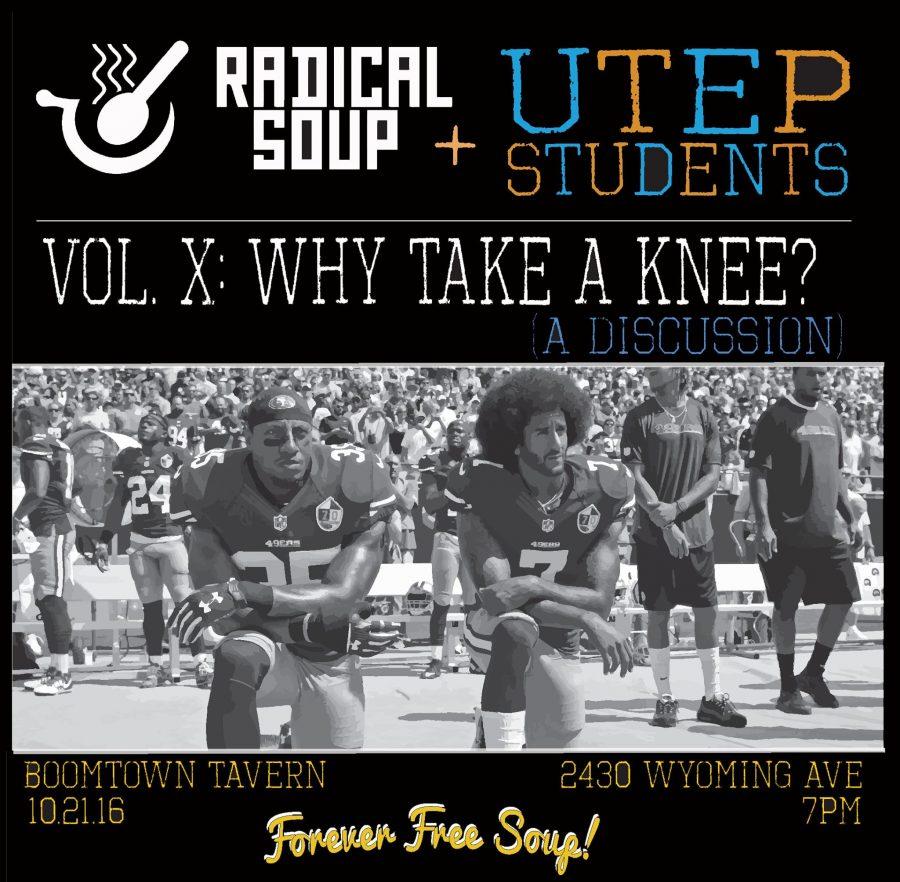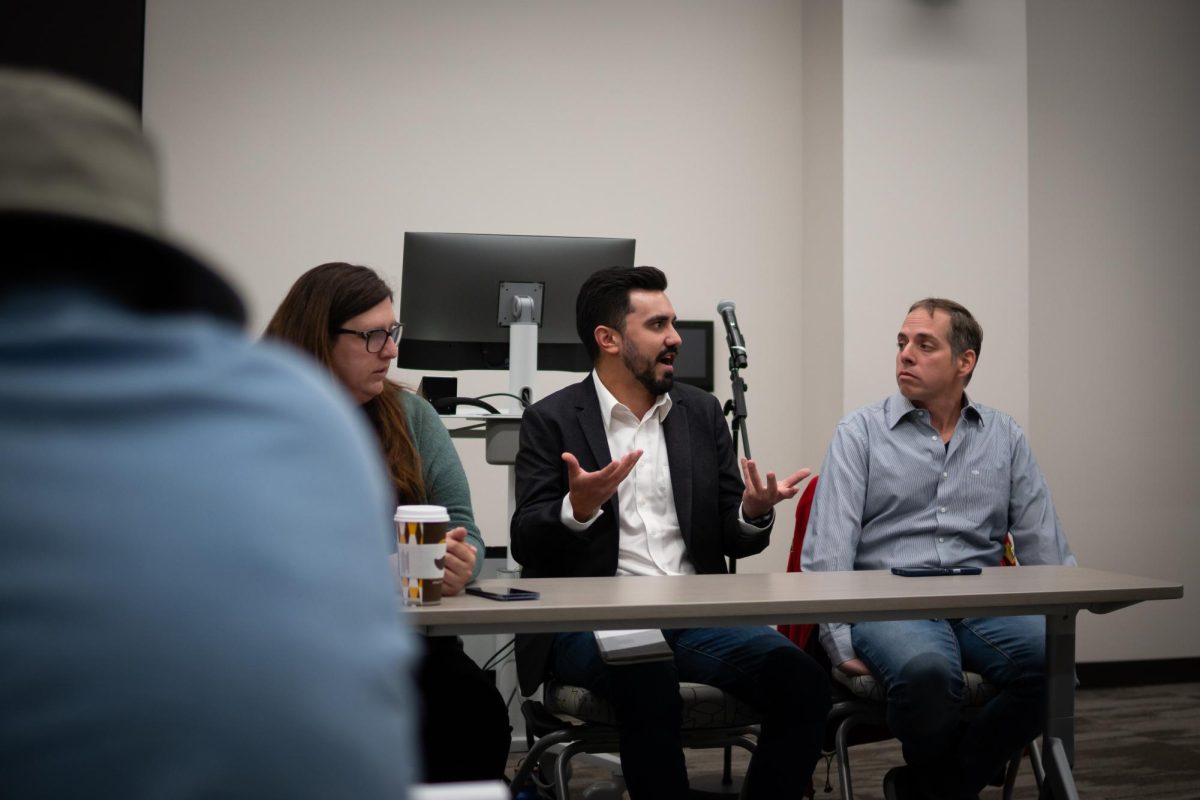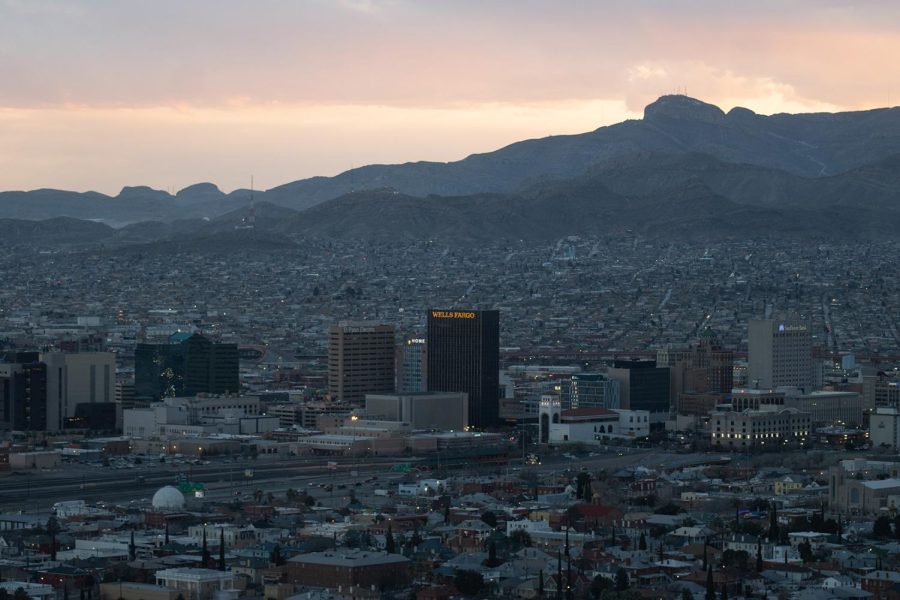When the national anthem is played at Saturday’s UTEP football homecoming game, a portion of the audience will either be on one bent knee or raising their fist in protest. In conjunction with a local organization called Radical Soup, a group of UTEP students have been working the past few weeks to organize a silent protest prior to the game to draw attention to several different issues relating to racism within the United States.
One of the protests organizers, senior biology major Shyla Cooks, said that the protest is meant to point out a few main issues.
“The first would be the racist context of the original national anthem in general and how it mentions slaves and slavery. Another is police brutality and just historic racial injustices in general,” Cooks said.
“The Star-Spangled Banner,” as originally written by Francis Scott Key contains four verses, although only the first verse is performed as the United States’ official national anthem.
Written from a British ship while watching the bombardment of Fort McHenry, Key was pleased to see the American flag waving by the “dawn’s early light” following a long night of war. Key, a slave owner and staunch anti-abolitionist, wrote the third verse, “No refuge could save the hireling and slave/From the terror of flight or the gloom of the grave,” as a taunt toward the slaves who were hoping to find freedom aboard the British ships docked under the light of the “rockets’ red glare” and “bombs bursting in air.”
As part of the Take a Knee protest, Cooks hopes to draw attention to the fact that the anthem may not fully represent everyone in the United States.
“I would rather that people be aware that it was written by someone who was a racist and it wasn’t written for everyone, only certain people—start a new anthem if we have to,” Cooks said. “If we’re supposed to be a united country, then we’re supposed to be inclusive of everyone of all races and colors.”
Racial tension in the United States rose in the past year with protests over police brutality leading to the rise of the Black Lives Matter movement among others. Numerous politicians, celebrities and athletes have taken up the cause to draw attention to what they perceive as injustices toward minorities from the law enforcement community.
Most recently, San Francisco 49ers quarterback Colin Kaepernick kneels during the national anthem prior to his team’s games as a way of protesting.
For sophomore biochemistry major Miguel Angel Olvera Acosta, the injustices toward all kinds of groups in the United States has become so pervasive that protest is the logical next step.
“For me, it’s mostly because of all the recent attacks to minorities and I’m not just talking about Latinos or black communities, also our brothers and sisters that are Muslims or gay,” Olvera Acosta said.
No reason was given by the organizers for picking this specific game, although participant Olvera Acosta thinks it may have had something to do with the increased attendance usually seen during homecoming. Saturday’s homecoming game in the past has seen greater attendance because more alumni usually travel back to El Paso for this game.
“I don’t really see why this game, when it can be done in any kind of event. I guess (it) is because more people attend this and also the school UTEP is playing against does this circle thing, many of us know for what it stands, so I guess it’s the correct moment,” Olvera Acosta said.
The Circle of Unity that the Old Dominion Monarchs have been participating in during this season’s football games is their way of showing unity, rather than protesting the anthem. The gesture first began when all four captains of the ODU team donned Black Lives Matter shirts prior to their game with UT-San Antonio on Sept. 24.
Rather than protest the anthem, the team joined hands in a circle and raised them to the sky following the national anthem as a symbol of unity. The next week, prior to the game with Charlotte and following yet another high-profile police shooting, this time in Charlotte, the ODU players joined hands with the Charlotte players for the Circle of Unity. The gesture has now carried over into each subsequent game.
Traditionally, UTEP players are not on the field during the national anthem and therefore have not had any incidents of kneeling during the song. This week, head coach Sean Kugler has said kneeling is definitely not in his plan for him or his players, but a show of unity might be.
“I’ll talk to (ODU coach Bobby Wilder) about that,” Kugler said. “From my standpoint, I want to honor the flag of the United States. You won’t see me kneeling. I’ll talk to him this week and see what we can do in unity later this week.”
Olvera Acosta thinks that UTEP players joining the Circle of Unity would be a great step toward acknowledging what the protestors will be doing in the stands that day.
“I would love to see them joining the Circle of Unity before the game, also them joining the students or maybe going out to the field and kneeling,” Olvera Acosta said.
Following the onset of Kaepernick’s kneeling protest, Bill McRaven, University of Texas System chancellor, sent a letter out to all schools in the system urging athletes to stand in honor of the flag and not repeat Kaepernick’s gesture. McRaven’s memo speaks more about honoring the flag and not about the anthem.
The “Take a Knee” organizers invite anyone who would like to participate in the protest to take a knee or raise a fist during the anthem as part of their peaceful protest.
“Of course it would be nice if a lot of people were involved in it, A lot of people just lay dormant on these issues. It would be great if a lot of people would be interested in taking a knee,” Cooks said.





